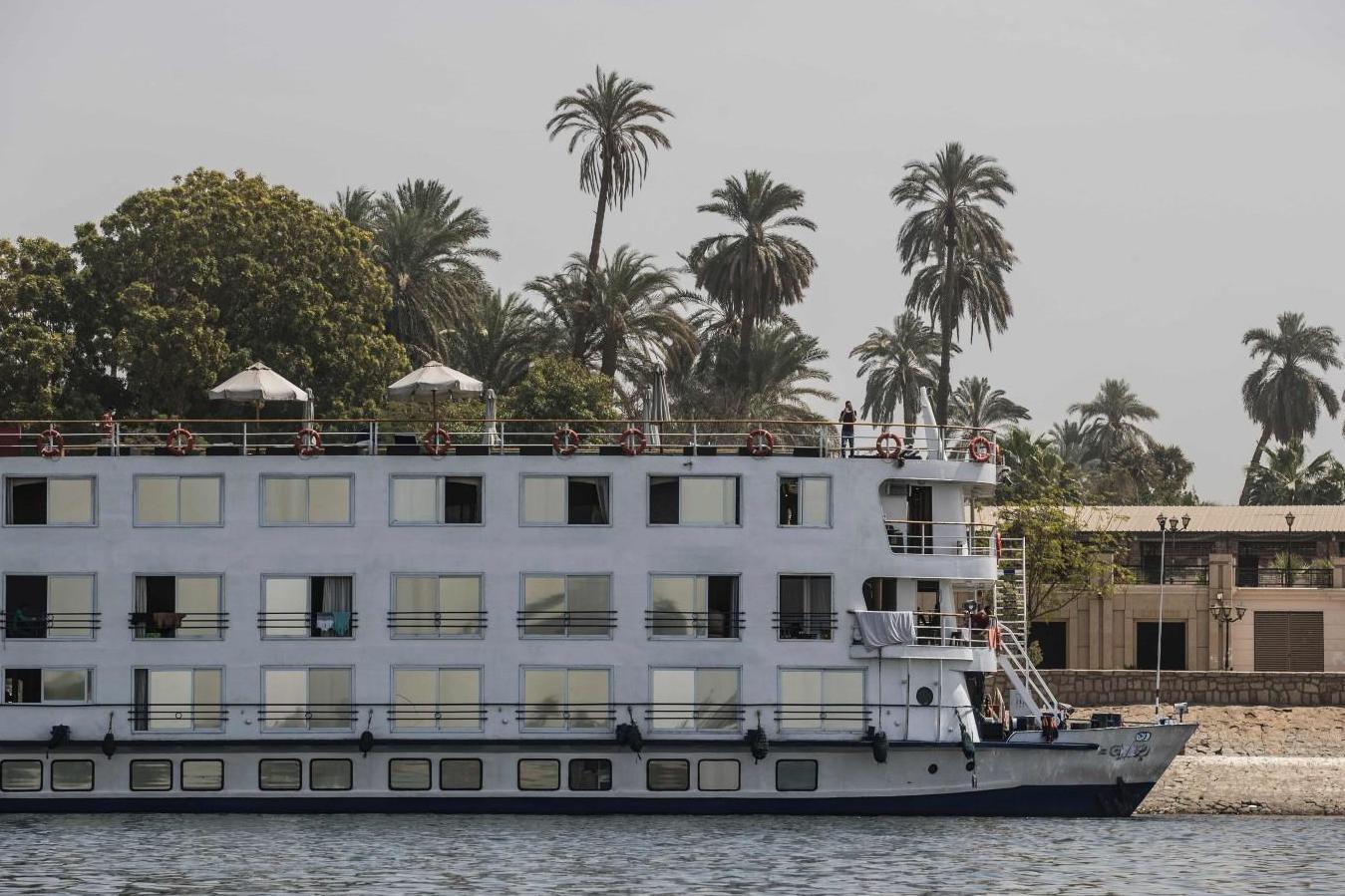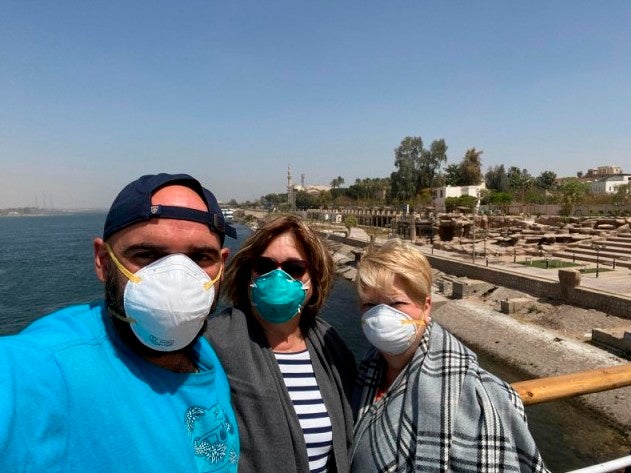Coronavirus: How a Nile river cruise spawned an intercontinental outbreak
Inept quarantine measures formed another mini epicentre for Covid-19 to spread yet again to America

Your support helps us to tell the story
From reproductive rights to climate change to Big Tech, The Independent is on the ground when the story is developing. Whether it's investigating the financials of Elon Musk's pro-Trump PAC or producing our latest documentary, 'The A Word', which shines a light on the American women fighting for reproductive rights, we know how important it is to parse out the facts from the messaging.
At such a critical moment in US history, we need reporters on the ground. Your donation allows us to keep sending journalists to speak to both sides of the story.
The Independent is trusted by Americans across the entire political spectrum. And unlike many other quality news outlets, we choose not to lock Americans out of our reporting and analysis with paywalls. We believe quality journalism should be available to everyone, paid for by those who can afford it.
Your support makes all the difference.By the time Egyptian health authorities learned about the coronavirus case on the Nile cruise ship, the infections had spread around the world.
As long ago as late January, a Taiwanese American passenger on the MS Asara was carrying the novel coronavirus, health officials said. But the vessel would make at least four more cruises, and at least 12 crew members would turn out to be infected. Some or all of them had worked on the cruises in February and early March, said a crew member under quarantine and a senior health official in Luxor.
Hundreds of foreign passengers, including dozens of Americans, and Egyptians were potentially exposed to the virus between mid-February and early March; a dramatic illustration of how, from a single, overlooked infection, the novel coronavirus could swiftly multiply and be carried across the globe.
At least six Americans infected aboard the Asara returned to the US state of Maryland, according to Governor Larry Hogan, potentially seeding their communities with the virus. Twelve others have reportedly tested positive in the Houston area. The Centers for Disease Control and Prevention is contacting dozens of other Americans who were aboard the Asara in February to test them or ask them to self-quarantine.
Even after Egyptian health authorities were notified 1 March that the Taiwanese American woman had been carrying the virus while on the Asara and may have infected others on the ship, the vessel set sail on 5 March on yet another cruise while Egyptian health officials awaited the results of tests on the crew.
By then, an American travel agency that books Nile cruises had been told by the Centre for Diseases Control and Prevention (CDC) that Americans on an earlier cruise of the Asara may have been infected. The travel agency, Gate 1, contacted the boat operator and the Egyptian Embassy in Washington, according to the company’s vice president for marketing, Marty Seslow. Gate 1 was informed that all the crew had tested negative for the virus, Mr Seslow said.
“We were given information that no one was sick and everyone was fine,” Mr Seslow said. “Within 24 hours, we were told dozens were sick.”
Although Gate 1 was initially informed that the crew had tested negative, Mr Seslow said the company decided to tell those clients aboard the ship about the CDC’s notification and offered to end their trip. But the passengers chose to remain on board.
“The reason we decided to stay on the vessel is because we were told initially that the crew had been tested and they had tested negative, and the ship had been disinfected twice,” said Amy Khamissian, 65, a paralegal from Miami. “We figured we’d be safer in this confined area. We were, at that point, misinformed.”
Less than a day later, when the ship reached Luxor, the passengers’ throats and nostrils were swabbed and blood was collected.

Thirty-three of them tested positive, including at least three Americans and 16 other foreigners, in addition to the 12 infected crew members. The infected passengers and crew members were taken to a hospital in northern Egypt for isolation and treatment. The rest, including 26 Americans and at least 56 other foreigners, were quarantined on the vessel.
With 64 comfortable cabins and two suites, the Asara is popular with American and other foreign travelers. It has five decks, including a sun deck and swimming pool, and can carry as many as 132 passengers. The travel agency Gate 1 alone placed an average of 35 American clients on each weekly sailing since the beginning of the year, including the last trip.
Each Wednesday, the ship departs on a cruise between the southern city of Aswan and Luxor. The American passengers on four trips – departing 12 February, 19 February, 26 February and 4 March – are now considered persons of interest by the CDC, Mr Seslow said, adding that Gate 1 was cooperating with US health authorities and the US State Department.
Retirees Pamela Allen, 69, and Harold Allen, 72, of Pennsylvania boarded the Asara on 26 February. They were in Egypt for a nine-day trip, thinking they were getting away from the coronavirus tumult. Their vacation destination seemed to be free of the cases popping up elsewhere in the world.
“No one talked about the virus,” Pamela Allen said. “We would see it on the news, but we weren’t concerned. It was far away.”
But toward the end of their cruise, workers began to “clean like mad,” she said. “We didn’t think anything of it at the time,” she said. “Hindsight tells us now that they knew.”
When the couple flew back home to Pennsylvania on 5 March, US customs officers asked whether they had been in China. When they said they had traveled to Egypt, they were waved through. Only when they saw news that their ship had been put under quarantine did they wonder whether they, too, should be in quarantine. Neither showed signs of illness.
Their tour company, Gate 1, contacted their local health department, which called the Allens, and told them to stay home. Officials wearing masks, gowns and gloves showed up at their door with paperwork as well as masks for the couple to wear.
“It could be worse,” Pamela Allen said. “We could be quarantined in Egypt.”
On 6 March, the same day the Asara sailed into Luxor on its last cruise, Mr Hogan reported that three Montgomery County residents had tested positive for the virus and said they all contracted it on an Asara cruise.
The three travellers had returned to the United States on 20 February. By the time they were tested for the virus on 4 March, one had attended an event near Philadelphia, coming into contact with students and teachers from a local school, Mr Hogan said. He added that the school district later closed five schools.
Another of the three travellers went to an event at a retirement community in Rockville and came into contact with between 70 and 100 people. Mr Hogan urged anyone who attended the Rockville event to contact a doctor or call a Maryland hotline.
He later said three other Maryland residents had been infected on the Asara. At least 12 novel-coronavirus cases in the Houston area are linked to that vessel, according to the Houston Chronicle.
There are now more than 110 cases of foreigners reportedly testing positive for the coronavirus after recent tourist travel in Egypt, including Nile cruises. They include citizens of Greece, France, Canada and Americans from several states, including Iowa, Florida and California. In Virginia, at least four coronavirus cases are linked to Nile cruises. It has not been publicly disclosed whether those infected had been aboard the Asara.
The Asara cruises, ranging from two to seven nights, typically stop in the Nile River temple towns of Edfu, Kom Ombo and Esna. There, the Asara passengers would have been in close contact with scores of traders in markets, as well as hundreds of passengers from other boats. When they dock, boats are often lashed to each other, and Asara passengers would cross other ships to reach the shore, and passengers from other vessels would walk through the Asara. The crews of different ships would interact.
“If the crew had been infected ... they would have posed a danger to everyone,” a Luxor health official said.
None of the 12 infected members of the Asara crew showed symptoms, according to Egyptian health officials. They were all members of the household staff, who cleaned the cabins, washed the laundry and carried luggage, said the Luxor health official and the quarantined crew member who is still on the boat and spoke by telephone.
Some of the infected crew went on leave to visit their families, said the quarantined crew member, who also said he knows of seven such instances. Their families, he said, were tested for the virus, though he did not know the results. His own family, though, has not been tested. Nor have any of the traders in the Nile towns visited by the Asara passengers, said the health official.
“If they had shown symptoms, they would have gone to the hospital,” the official said. “Our hospital in Aswan did not receive a single case.”
The outbreak aboard the Asara has torpedoed the tourist season. There has been a sharp decrease in recent days in the number of foreign tourists coming to Luxor, home to the famed Karnak Temple and the tomb of the boy king Tutankhamen, and a huge drop in local incomes.
Farrag Yousef, a tour guide, recently refused a job on a cruise ship. “Many of my tour guide friends are afraid as well,” he said. “We fear catching corona.”
On the Asara, crew members worry about the future. One quarantined crew member – a 30-year-old cook – has a wife, and they are expecting their first child. They and his mother depend on his $200 (£162) monthly salary from the Asara.
But now he’s worried he may never find a job. Even though he has tested negative, he fears there will forever be a stigma associated with the Asara. Already, relatives of crew members have been harassed. “They are being targeted,” said the cook, who spoke on the condition of anonymity because he fears attacks on his own family.
This week, in an attempt to defuse fears about the virus and entice tourists to return, Egyptian health officials in Luxor randomly tested more than 2,400 people in hotels and on cruise ships, said the senior health official. They all tested negative, he said.
“It’s a very weak virus,” he declared.
That was enough to convince Egyptian health officials to end the quarantine of the 82 foreigners who were being held on board the Asara and send them home, even though the potential incubation period during which they could develop symptoms wasn’t even half over. A day earlier, they had been told they would be tested again by health officials, according to passengers.
They all left Egypt on commercial flights.
Ashley Colette, one of the passengers, who travelled from Luxor to Cairo to Dallas said: “They didn’t even check my temperature at any of the airports.”
When she returned home, she emailed the Texas Department of Health to ask for another coronavirus test, hoping to confirm that she was still virus-free, but the department responded that she couldn’t get a test since she wasn’t experiencing symptoms of the coronavirus disease.
“It’s like most people aren’t taking it seriously,” she said.
The Washington Post
Join our commenting forum
Join thought-provoking conversations, follow other Independent readers and see their replies
Comments